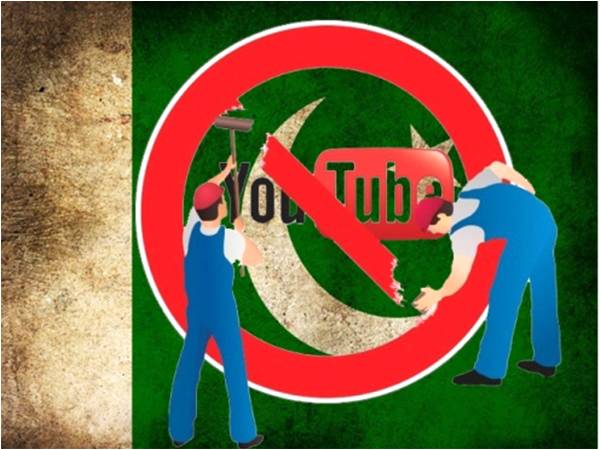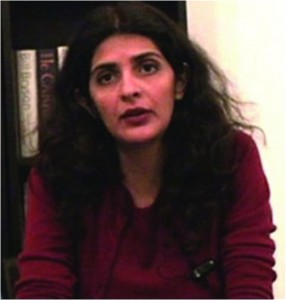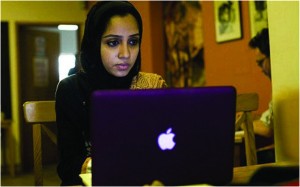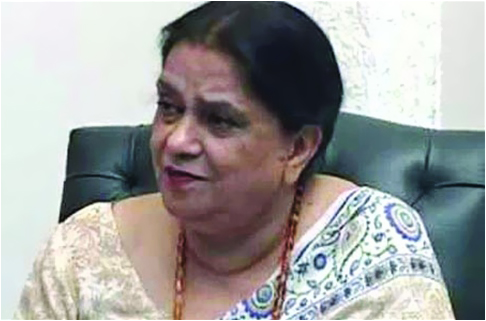
Nearly a year after the YouTube ban came into effect in Pakistan, the YouTube case, Bytes for All v. Federation of Pakistan, (958/2013) was filed by BytesForAll a non-profit human rights organization with Yasser Latif Hamdani as their lawyer. Following 14 hearings, On September 19 2013, Lahore High Court’s (LHC) Justice Mansoor Ali Shah referred the case to the larger bench.
On May 6 the National Assembly (NA) unanimously adopted a resolution to lift the ban but the people of Pakistan are still waiting for a resolution of the situation. The government says it is waiting for directions from the LHC.
Banning information
Earlier this week Muttahida Qaumi Movement’s (MQM) Senator Nasreen Jalil wrote a letter to the Prime Minister asking him to lift the ban on YouTube. Highlighting the importance of YouTube as an important social media website and an invaluable source of information, Jalil mentioned in her letter that the LHC had also asked to lift the ban and so it made little sense to procrastinate on the matter. She believes that banning YouTube is akin to banning information, and while discussing the matter, highlighted that the ball now is in the IT ministry’s court.
“Following the NA’s resolution in favouring of lifting the ban on YouTube I had a little discussion with IT Minister (Anusha Rehman) and I told her that if the government lifts the ban, then the case in the Supreme Court (SC) would be rendered null and void. For all practical purposes, the ball is now in the IT ministry’s court and I for one cannot fathom the reasons behind the delay in lifting the ban. Even the LHC has given the green signal,” she said.
So what are the odds of the ban being uplifted by the IT ministry? Not very high, is the popular opinion.

Fighting the Odds
“The odds are dim for the moment,” says Gul Bukhari from BytesForAll, also a human rights activist and columnist for The Nation. “Passing resolutions is the National Assembly’s favourite pastime. Face it, an executive order and not a resolution will eventually unblock YouTube, though a resolution from the NA should by rights provide the government with the impetus and the courage to do the right thing,” she adds.
Sana Saleem from Bolo Bhi a non-profit organisation focusing on internet access, digital security and privacy among other issues also emphasised that the ball remains in the federal government’s court.
“National Assembly resolutions are not legally binding. They simply mean that the members of the National Assembly urge the government to lift the ban. The decision still lies with the federal government. However, the NA resolution and the resolution passed by the Senate’s Human Rights Committee, shows that policymakers across the board urge the lifting of the ban. It also creates an enabling environment for the government that has publicly been saying that the ban continues because of ‘popular demand due to the video’” she said.

Yasser Latif Hamdani was optimistic.
“With the High Court order dated 13.5.2014, we have won in principle because the court said that YouTube must be unblocked and that the government was hiding behind the SC order. However the Supreme Court order stands in our way. We have been asked to seek a clarification as to what the SC meant when it said what it said. It may take a few more months. As Faiz would say “faqat chand roz aur meri jaan.””
Hamdani believes that the NA resolution showcases popular opinion, and reiterated that legal hurdles have been overcome.
“The NA resolution shows the national will of the people. It was a unanimous resolution. Though it is not a law but then a simple vote of no confidence can bring down a government. Therefore it is an extraordinary achievement to have a unanimous resolution in favour of the unblocking of YouTube. Legally though we have to overcome the SC Challenge.”
Legal loopholes
Hamdani believes that the case for banning YouTube has had loopholes all along.
“Article 19 of the Constitution provides the right to freedom of expression and speech, subject to certain claw-backs (such as national security, glory of Islam etc.) which are to manifest themselves only as “reasonable restrictions imposed by law”. Our first objection to the entire exercise was that there was no Law empowering PTA or MOIT to ban the website. Our objection was to the arbitrary nature of the ban and the complete block that necessarily violated Article 19. I argued that the government needed to prove that its actions safeguarded national security and the glory of Islam and what have you and that banning the video only served to put our heads in the sand. I argued that 30 million Pakistanis, most of whom are Muslims, on the web can respond to and flag the video but we have taken that right away. Therefore I argued that the government failed to make that case,” Hamdani said.
The government’s response wasn’t very comprehensive.
“In response to this argument - the Government brought the judgment of the Supreme Court by Chaudhry Iftikhar , which called for a blocking of all instances of the objectionable video on Youtube (supreme court order refers to it as “U-tube” repeatedly) and other websites. My argument was that if we construe the way the government is construing this order, then perhaps we would be required to block the entire internet in Pakistan. Instead I argued that YouTube with interstitial warning pages should be considered enough of a block,” he added.
Ever since the ban on YouTube the ostensible ‘double standards of the West’ has been used as an argument in favour of the ban. When the reality of the matter is that the trailer for Innocence of Muslims doesn’t violate Google’s terms of use that YouTube uses to decide which videos need to be taken down. Hamdani explains how:
“The trailer does not violate Google’s terms of use, offensive as it is. If you read the terms of service you will find this clear disclaimer:
“You understand that all information, data, text, software, music, sound, photographs, graphics, video, messages or other materials (“Content”) are the sole responsibility of the person from which such Content originated. Google reserves the right, but shall have no obligation, to pre-screen, flag, filter, refuse, modify or move any Content available via Google services. You understand that by using Google services you may be exposed to Content that is offensive, indecent or objectionable, and that you use Google services at your own risk.”
Furthermore, Google considers itself subject to only US Law. It has been a consistent position on their part. The US’s first amendment protects all speech, including offensive speech and hate speech, so long as it does not directly, explicitly, calls for violence.”
Religions Sentiments and Freedom of speech
The only reason the YouTube ban has lingered on for nearly two years is because of the religious subplot and the ‘sensitivities’ of the right wing parties. Jalil believes that Pakistan should not act as the sole ‘contractor’ of religion.
“Why do we have to act like we are the sole stakeholder of Islam? Can we not learn from the rest of the Muslim world,” asks Bukhari.
“It is very important to see ‘sentiment’ in context. First, it is too subjective an idea to protect religious or any other sentiments from being hurt. Second, there are all manner of sentiments, and raising one undefined concept over all other sentiments or sensibilities is very dangerous. Indeed, the frequent extra judicial killings being witnessed in Pakistan is the direct result of having done so. So personally I do not think creating intolerance of alternative views in the garb of ‘protecting religious sentiment’ should have any place in a modern, civilized society. If we continue on this path, forget the internet, you can say good bye to all freedoms in time.
We need to make freedom of speech, especially on the internet, a robustly defended concept. If we do not, all manner of censorship will kick in under the guise of religious sensitivities. People are free not to click on material they find offensive. Indeed interstitial warnings, before any potentially offensive material, is a brilliant solution offered by Google. Pakistan should grab the offer and PTA should do the needful in identifying such material. Indeed, it will give them something better to do then killing flies.”
Saleem highlights the misuse of the phrase “religious sentiments” to curb freedom of speech.
“Internet is not broadcast media. Any and all content on the internet requires voluntary access. In this particular instance specifically the content needs to be actively searched to be able to access it. Yet, the Ministry has repeatedly used “religious sentiments” as an excuse to continue the ban. Religion, morality and national security are used as ploys to continue clamping down on speech. YouTube is only one example of the ad hoc manner in which the Government cracks down on speech online. Using religious sentiments, morality and national security as an excuse makes any dissent vulnerable to accusations of “anti-Islam/traitor/immoral” etc. thereby limiting any debate on open access and free speech.”
Internet Filtering
Another proposal being mulled over during the YouTube debate has been to block the URL for the questionable videos alone on URL. Hamdani explains why merely blocking particular URLs wasn’t considered in the court.
“The stance of the MoIT and PTA is that they are doing that pursuant to an interim order of the Supreme Court (17.9.2012) which wants a complete block on the objectionable video. Since the complete block is not technically possible given https (encrypted mode), they have resorted to blocking the whole website,” he said.
Both Bukhari and Saleem question the rationale behind internet filtering.
“How can filtering be a way forward? That is arbitrary censorship. Who will filter? What will be their criteria? And why on earth should there be any filtering? For goodness sake, we the people of Pakistan have been treated like stupid idiots by the state for long enough. Enough is enough. Filtering has to stop and people allowed to make own choices. This is why I say all this sentiment business is over hyped garb under which a) political censorship becomes very easy for governments to carry out, and b) the religious lobby makes its naked grab for power,” Bukhari said.

Saleem highlighted the need for self-regulation.
“Through internet filtering you will simply be giving the Government to be a grand nanny for the entire nation. Authorities should be using resources to educate people on how to limit access to such content at home i.e filters for kids or filters for their personal browsers. Self regulation is the way forward and the only way we can avoid crackdown on the right to information,” she said.
What Next?
What needs to be done next is becoming more evident every day. Whether or not the government goes ahead with it, is the question.
“Everyone knows what is right and what should be done, including the PML-N government. But everyone is scared of the far right element in society. Too many people have lost their lives trying to do or say the right thing. Therefore what you see is the ball being thrown around into the ‘others’’ court. The government would much rather the judiciary handled the hot potato. And to an extent the government is justified: it was the superior judiciary that gave the technically unfeasible and emotional order that led the PTA to block YouTube in its entirety. Under Chaudhry Iftikhar, the Supreme Court was quite a terror after all. I’m not surprised the PTA just took YouTube off the cyberwaves to appease the court,” Bukhari said.
Saleem also echoes these assertions and believes that the government needs to lift the ban as soon as possible. “The LHC is on board and the NA resolution should provide the needed impetus. What needs to be done is quite obvious really. Whether or not the IT ministry does its job is still not clear though, unfortunately,” she said.
On May 6 the National Assembly (NA) unanimously adopted a resolution to lift the ban but the people of Pakistan are still waiting for a resolution of the situation. The government says it is waiting for directions from the LHC.
Banning information
Earlier this week Muttahida Qaumi Movement’s (MQM) Senator Nasreen Jalil wrote a letter to the Prime Minister asking him to lift the ban on YouTube. Highlighting the importance of YouTube as an important social media website and an invaluable source of information, Jalil mentioned in her letter that the LHC had also asked to lift the ban and so it made little sense to procrastinate on the matter. She believes that banning YouTube is akin to banning information, and while discussing the matter, highlighted that the ball now is in the IT ministry’s court.
“Following the NA’s resolution in favouring of lifting the ban on YouTube I had a little discussion with IT Minister (Anusha Rehman) and I told her that if the government lifts the ban, then the case in the Supreme Court (SC) would be rendered null and void. For all practical purposes, the ball is now in the IT ministry’s court and I for one cannot fathom the reasons behind the delay in lifting the ban. Even the LHC has given the green signal,” she said.
So what are the odds of the ban being uplifted by the IT ministry? Not very high, is the popular opinion.

[quote]"Passing resolutions is the National Assembly's favourite pastime."
- Bytes for All representative Gul Bukhari[/quote]
Fighting the Odds
“The odds are dim for the moment,” says Gul Bukhari from BytesForAll, also a human rights activist and columnist for The Nation. “Passing resolutions is the National Assembly’s favourite pastime. Face it, an executive order and not a resolution will eventually unblock YouTube, though a resolution from the NA should by rights provide the government with the impetus and the courage to do the right thing,” she adds.
Sana Saleem from Bolo Bhi a non-profit organisation focusing on internet access, digital security and privacy among other issues also emphasised that the ball remains in the federal government’s court.
“National Assembly resolutions are not legally binding. They simply mean that the members of the National Assembly urge the government to lift the ban. The decision still lies with the federal government. However, the NA resolution and the resolution passed by the Senate’s Human Rights Committee, shows that policymakers across the board urge the lifting of the ban. It also creates an enabling environment for the government that has publicly been saying that the ban continues because of ‘popular demand due to the video’” she said.

[quote]“With the NA resolution we have won in principle but the SC order stands in our way”
– Yasser Latif Hamdani, Lawyer YouTube case[/quote]
Yasser Latif Hamdani was optimistic.
“With the High Court order dated 13.5.2014, we have won in principle because the court said that YouTube must be unblocked and that the government was hiding behind the SC order. However the Supreme Court order stands in our way. We have been asked to seek a clarification as to what the SC meant when it said what it said. It may take a few more months. As Faiz would say “faqat chand roz aur meri jaan.””
Hamdani believes that the NA resolution showcases popular opinion, and reiterated that legal hurdles have been overcome.
“The NA resolution shows the national will of the people. It was a unanimous resolution. Though it is not a law but then a simple vote of no confidence can bring down a government. Therefore it is an extraordinary achievement to have a unanimous resolution in favour of the unblocking of YouTube. Legally though we have to overcome the SC Challenge.”
Legal loopholes
Hamdani believes that the case for banning YouTube has had loopholes all along.
“Article 19 of the Constitution provides the right to freedom of expression and speech, subject to certain claw-backs (such as national security, glory of Islam etc.) which are to manifest themselves only as “reasonable restrictions imposed by law”. Our first objection to the entire exercise was that there was no Law empowering PTA or MOIT to ban the website. Our objection was to the arbitrary nature of the ban and the complete block that necessarily violated Article 19. I argued that the government needed to prove that its actions safeguarded national security and the glory of Islam and what have you and that banning the video only served to put our heads in the sand. I argued that 30 million Pakistanis, most of whom are Muslims, on the web can respond to and flag the video but we have taken that right away. Therefore I argued that the government failed to make that case,” Hamdani said.
The government’s response wasn’t very comprehensive.
“In response to this argument - the Government brought the judgment of the Supreme Court by Chaudhry Iftikhar , which called for a blocking of all instances of the objectionable video on Youtube (supreme court order refers to it as “U-tube” repeatedly) and other websites. My argument was that if we construe the way the government is construing this order, then perhaps we would be required to block the entire internet in Pakistan. Instead I argued that YouTube with interstitial warning pages should be considered enough of a block,” he added.
Ever since the ban on YouTube the ostensible ‘double standards of the West’ has been used as an argument in favour of the ban. When the reality of the matter is that the trailer for Innocence of Muslims doesn’t violate Google’s terms of use that YouTube uses to decide which videos need to be taken down. Hamdani explains how:
“The trailer does not violate Google’s terms of use, offensive as it is. If you read the terms of service you will find this clear disclaimer:
“You understand that all information, data, text, software, music, sound, photographs, graphics, video, messages or other materials (“Content”) are the sole responsibility of the person from which such Content originated. Google reserves the right, but shall have no obligation, to pre-screen, flag, filter, refuse, modify or move any Content available via Google services. You understand that by using Google services you may be exposed to Content that is offensive, indecent or objectionable, and that you use Google services at your own risk.”
Furthermore, Google considers itself subject to only US Law. It has been a consistent position on their part. The US’s first amendment protects all speech, including offensive speech and hate speech, so long as it does not directly, explicitly, calls for violence.”

[quote]"Pakistan should not act as the sole 'contractor' of religion"
– MQM Senator Nasreen Jalil[/quote]
Religions Sentiments and Freedom of speech
The only reason the YouTube ban has lingered on for nearly two years is because of the religious subplot and the ‘sensitivities’ of the right wing parties. Jalil believes that Pakistan should not act as the sole ‘contractor’ of religion.
“Why do we have to act like we are the sole stakeholder of Islam? Can we not learn from the rest of the Muslim world,” asks Bukhari.
“It is very important to see ‘sentiment’ in context. First, it is too subjective an idea to protect religious or any other sentiments from being hurt. Second, there are all manner of sentiments, and raising one undefined concept over all other sentiments or sensibilities is very dangerous. Indeed, the frequent extra judicial killings being witnessed in Pakistan is the direct result of having done so. So personally I do not think creating intolerance of alternative views in the garb of ‘protecting religious sentiment’ should have any place in a modern, civilized society. If we continue on this path, forget the internet, you can say good bye to all freedoms in time.
We need to make freedom of speech, especially on the internet, a robustly defended concept. If we do not, all manner of censorship will kick in under the guise of religious sensitivities. People are free not to click on material they find offensive. Indeed interstitial warnings, before any potentially offensive material, is a brilliant solution offered by Google. Pakistan should grab the offer and PTA should do the needful in identifying such material. Indeed, it will give them something better to do then killing flies.”
Saleem highlights the misuse of the phrase “religious sentiments” to curb freedom of speech.
“Internet is not broadcast media. Any and all content on the internet requires voluntary access. In this particular instance specifically the content needs to be actively searched to be able to access it. Yet, the Ministry has repeatedly used “religious sentiments” as an excuse to continue the ban. Religion, morality and national security are used as ploys to continue clamping down on speech. YouTube is only one example of the ad hoc manner in which the Government cracks down on speech online. Using religious sentiments, morality and national security as an excuse makes any dissent vulnerable to accusations of “anti-Islam/traitor/immoral” etc. thereby limiting any debate on open access and free speech.”
Internet Filtering
Another proposal being mulled over during the YouTube debate has been to block the URL for the questionable videos alone on URL. Hamdani explains why merely blocking particular URLs wasn’t considered in the court.
“The stance of the MoIT and PTA is that they are doing that pursuant to an interim order of the Supreme Court (17.9.2012) which wants a complete block on the objectionable video. Since the complete block is not technically possible given https (encrypted mode), they have resorted to blocking the whole website,” he said.
Both Bukhari and Saleem question the rationale behind internet filtering.
“How can filtering be a way forward? That is arbitrary censorship. Who will filter? What will be their criteria? And why on earth should there be any filtering? For goodness sake, we the people of Pakistan have been treated like stupid idiots by the state for long enough. Enough is enough. Filtering has to stop and people allowed to make own choices. This is why I say all this sentiment business is over hyped garb under which a) political censorship becomes very easy for governments to carry out, and b) the religious lobby makes its naked grab for power,” Bukhari said.

[quote]“Through internet filtering you will simply be giving the Government the right to be a grand nanny for the entire nation”
– Sana Saleem, Civil Rights Activist and founder of BoloBhi[/quote]
Saleem highlighted the need for self-regulation.
“Through internet filtering you will simply be giving the Government to be a grand nanny for the entire nation. Authorities should be using resources to educate people on how to limit access to such content at home i.e filters for kids or filters for their personal browsers. Self regulation is the way forward and the only way we can avoid crackdown on the right to information,” she said.
What Next?
What needs to be done next is becoming more evident every day. Whether or not the government goes ahead with it, is the question.
“Everyone knows what is right and what should be done, including the PML-N government. But everyone is scared of the far right element in society. Too many people have lost their lives trying to do or say the right thing. Therefore what you see is the ball being thrown around into the ‘others’’ court. The government would much rather the judiciary handled the hot potato. And to an extent the government is justified: it was the superior judiciary that gave the technically unfeasible and emotional order that led the PTA to block YouTube in its entirety. Under Chaudhry Iftikhar, the Supreme Court was quite a terror after all. I’m not surprised the PTA just took YouTube off the cyberwaves to appease the court,” Bukhari said.
Saleem also echoes these assertions and believes that the government needs to lift the ban as soon as possible. “The LHC is on board and the NA resolution should provide the needed impetus. What needs to be done is quite obvious really. Whether or not the IT ministry does its job is still not clear though, unfortunately,” she said.

